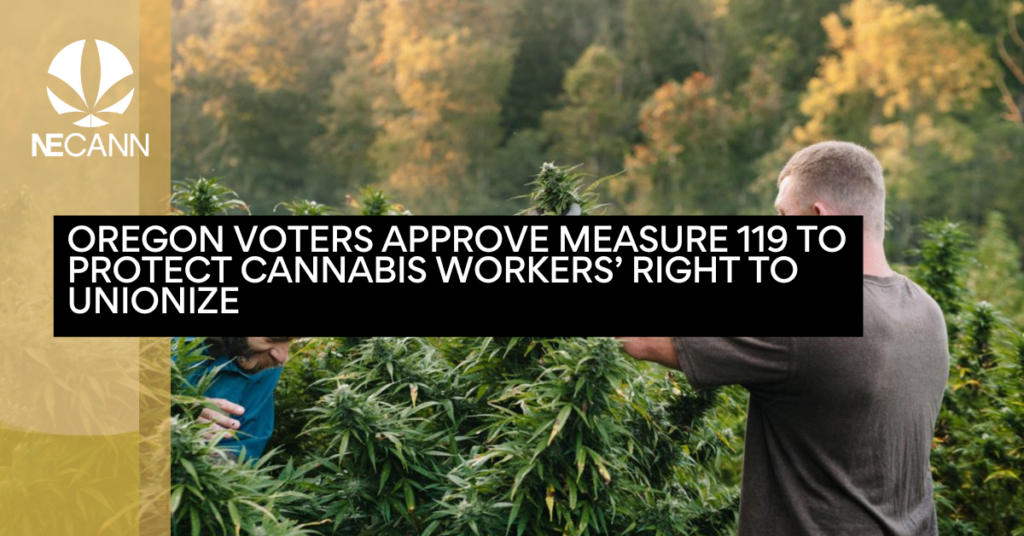Oregon voters passed Measure 119, a landmark decision aimed at securing the right of cannabis industry employees to join unions. With about 55% of voters supporting the measure and 45% opposing, this new legislation promises to close what advocates call an “age-old loophole” that had previously denied many cannabis workers union rights afforded to other industries.
The passage of Measure 119 marks a significant victory for labor advocates, including the United Food & Commercial Workers (UFCW) labor union, which led the campaign. In recent months, UFCW raised $2.24 million for a signature-gathering effort that helped bring the issue to voters after a similar legislative measure failed in the state Legislature earlier this year.
UFCW Leads Effort to Safeguard Cannabis Workers’ Rights
The UFCW, one of the largest unions representing cannabis workers across the country, took on the campaign for Measure 119 after an attempt to pass union protection legislation for cannabis workers in Oregon stalled. State lawmakers, including state Rep. Paul Hovey (D), raised concerns that a bill protecting cannabis workers’ union rights could potentially conflict with federal labor laws, prompting them to table the legislation.
According to Dan Clay, President of UFCW Local 555, the measure corrects a long-standing gap in worker protections. “Workers across every industry should have the freedom to unionize if they so choose,” Clay said. He argued that many cannabis companies had exploited an outdated law to restrict the rights of their employees. “Shady cannabis tycoons have taken advantage of an outdated law to strip workers’ rights that are guaranteed to nearly every other American.”
By securing union protections for cannabis workers, Measure 119 creates a more level playing field, ensuring that employees in Oregon’s growing cannabis sector have the same labor rights as their counterparts in other industries.
Challenges of Unionizing in the Cannabis Industry
Unionizing cannabis workers has been a complex issue nationwide. Although more states are legalizing cannabis, the industry remains federally illegal, creating challenges for both businesses and labor unions. Many labor laws do not fully apply to cannabis workers due to cannabis’s federal status as a Schedule I controlled substance, which classifies it alongside heroin and LSD.
Some companies in the cannabis industry have taken advantage of this loophole, UFCW leaders say, to block efforts by their employees to unionize. Unlike other industries, where federal and state labor laws strongly protect workers’ rights to organize, the cannabis industry operates in a gray area. This has allowed some cannabis employers to resist union efforts, leaving workers without a formalized means of addressing workplace grievances and negotiating for better pay and conditions.
Measure 119 aims to change that in Oregon by guaranteeing workers the right to organize. Supporters of the measure argue that unionizing could help address some of the common challenges faced by cannabis employees, including job instability, workplace safety issues, and wage disparities. Union representation could empower workers to advocate for safer working environments, fair wages, and better benefits.
Strong Voter Support Despite Concerns Over Federal Law
While Measure 119 passed with 55% of the vote, the measure faced significant opposition. Some lawmakers and industry groups raised concerns that the measure might still conflict with federal labor regulations. Opponents argue that Oregon’s legalization of union rights for cannabis workers could lead to legal challenges if federal authorities were to enforce cannabis’s federal status.
However, advocates like UFCW Local 555 President Dan Clay believe that the benefits of protecting workers outweigh the potential risks of federal pushback. “This ballot measure closes an age-old loophole that deprives that right to thousands of Oregon cannabis workers,” Clay said. For UFCW, the measure is an important step toward creating a safer, fairer industry in which employees’ rights are prioritized alongside corporate profits.
Implications for the Future of Labor in Cannabis
Oregon’s decision to pass Measure 119 signals a growing trend toward labor protections in the cannabis industry. With the U.S. cannabis industry continuing to expand, more states may consider similar measures to protect cannabis workers’ rights. In recent years, the UFCW and other labor unions have advocated for cannabis industry reforms, pushing for union protections in several states, including California, Illinois, and New York.
Unionization within the cannabis sector could have far-reaching implications for the industry, potentially improving job quality and standardizing working conditions. For employees, union protections can mean higher wages, better benefits, and access to a structured grievance process, creating a more equitable work environment.
As more states move to legalize cannabis, the conversation surrounding labor rights is likely to continue. Oregon’s approval of Measure 119 represents a step forward in addressing long-standing issues in cannabis labor and could pave the way for similar efforts across the country.
What’s Next for Measure 119?
Now that Measure 119 has passed, Oregon’s cannabis workers can legally organize under state law. The success of the measure will depend on how effectively unions and workers utilize their newfound rights. Additionally, how employers respond to unionization efforts will be crucial to the measure’s long-term impact.
For Oregon, Measure 119 highlights the growing recognition of cannabis workers’ contributions to the state’s economy and the need to protect their rights. As other states watch Oregon’s example, it could serve as a blueprint for future cannabis labor reforms, bringing the industry closer to parity with other legalized sectors.



